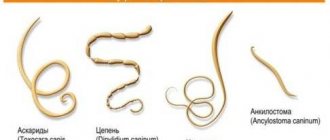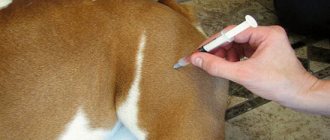Worms in a dog and other canine parasites are a real problem for the owner and a lot of unpleasant ailments for the pet itself. How to deworm a dog at home and are parasites dangerous for people?
Dog parasites are a fairly common disease. Any dog can have worms, even one that spends most of its time snuggled up on a soft sofa and spends its time walking mostly on a leash. However, they most often irritate these animals, which often run free and may come into contact with rodents infected with parasites or feces of other carriers, as well as stray dogs.
Why worm your dog?
Dogs often come into contact with parasites while walking. They become infected orally by licking contaminated grass or drinking water. Another way is to ingest fleas and eat rodents that carry the parasites.
Internal parasites affect your dog's health by causing diarrhea, vomiting, abdominal pain, general health problems, and gas. At first, however, no symptoms are visible and it takes a significant number of parasites in the digestive tract to worry the owner.
© shutterstock
Internal parasites that can be found in dogs:
- roundworms,
- nematodes,
- hair worms,
- hookworms,
- coccidia, lamblia.
Animals living with people need regular deworming (deworming the dog) for our safety. These parasites can often appear in humans, and lack of proper hygiene and hand washing every time after petting a dog can lead to infestation in children and adults living with the pet. Symptoms in humans are similar and include stomach pain, diarrhea, vomiting, fatigue or weight loss.
Medicines for worms
Drugs are tablets, pastes, gels or any other form of any medication that is produced by commercial pharmaceutical companies that give them a specific trade name (Cestal Plus, Pratel, Drontal Junior, Dolpac, Milbemax). Each of them contains at least one substance (for example, Panacur contains an active ingredient called fenbendazole).
Most medications for parasites contain up to three active compounds - these are complex drugs (for example, Cestal Plus, which consists of the active substances: pyrantel, fenbendazole and praziquantel). They all have a different spectrum of action and affect different forms of parasites.
After all, before deworming a dog before vaccination, the animals do not always undergo a stool examination, as a result of which it is not known what type of parasites are present. Therefore, you need to introduce a drug that kills all types of worms. Instead of using three different drugs, one broad-spectrum drug is often given.
You can now view the current price of the drug and buy it right here:
Clinical symptoms of helminthiasis
To prevent your dog from suffering from pain, you need to immediately determine the cause, the following symptoms will help you:
- salivation,
- swallowing saliva,
- abdominal pain,
- the outlines of the abdominal cavity are enlarged,
- flatulence,
- apathy,
- diarrhea.
However, the absence of symptoms does not mean the absence of internal parasites in the dog's body.
However, it is necessary to worm your dog regularly. It is also recommended to conduct a stool test so that if the result is positive, you will know what kind of parasite you are dealing with and choose the best treatment option for this situation.
Condition after cleaning: normal and deviations
Toxic substances in the drug and decay products of parasites in the animal’s body can cause intoxication. Therefore, it is important to monitor the dog’s condition and behavior, especially in the first hours after taking an anthelmintic.
Warning signs:
- lack of coordination, unsteady gait;
- convulsions;
- dilated pupils;
- increased salivation;
- vomiting mucus, watery diarrhea after deworming;
- pallor or cyanosis of the mucous membranes;
- the dog does not eat and refuses water;
- can't go to the toilet.
If the dog feels unwell after deworming, it is necessary to induce vomiting in the pet so that it vomits, and then give it an absorbent. If this does not help, you need to contact your veterinarian.
Important! If your pet is very lethargic after treatment, pay attention to his feces. If there are no dead worms in them, there is a chance that they are curled into a ball that cannot pass through the intestines. Perhaps the pet got sick because of this.
To avoid having to treat your pet for worms, it is important to pay attention to preventive measures. And this is not only the timely use of pharmaceutical drugs. Try not to let your animal walk on its own, and during a walk, watch your pet so that it cannot eat something from the ground or drink water from a puddle or open reservoir. Also, do not forget to treat the animal for fleas, which are carriers of internal parasite eggs.
How often should a dog be wormed?
Worming dogs is, along with vaccinations, a very important aspect of caring for the health of our pets. The administered pharmacological agent destroys those stages of the parasite that are present in the intestines when administered. Preventive deworming does not protect against parasite invasion, but significantly reduces the consequences of their possible existence.
There are many drugs for deworming, they can be used with different frequencies, in different forms (tablets, pastes, spot-on). It's best to ask your veterinarian which drug and how often to worm your dog.
When to worm a puppy for the first time
A dog expecting offspring can become infected with Toxocara or canine roundworm. The larva that enters the body does not pose a danger to the expectant mother, but passes through the placenta or breast milk to the puppies immediately after birth.
Adult Toxocara, parasitizing in the intestines and stomach, cause growth retardation and exhaustion. To destroy them, small pets are dewormed at 2-4 weeks of life .
For the first time, choose gentle one-component medications designed specifically for puppies:
- Prazitel;
- Kanikquantel;
- Prazicide.
The use of complex anthelmintics at an early age can lead to intestinal blockage due to excessive accumulation of dead parasites. Choose drugs with a long period of use, but a lower dosage. This will reduce the stress on the body.
2 weeks after deworming, repeat deworming is carried out. This procedure is aimed at destroying parasites that have hatched from previously laid eggs.
To minimize toxins, anthelmintics are prescribed along with the intake of sorbents, which are responsible for removing harmful substances from the body.
First deworming
Let's figure out when you should start worming your dog. This happens differently for puppies and adult dogs, so we will analyze each option in detail.
When to worm a puppy
The first deworming of a puppy usually occurs in the kennel and is carried out at approximately 2-3 weeks of age . The following should be carried out every 14 days , up to two weeks after weaning the dogs from the bitch. Older puppies are dewormed on average once a month until they are six months old.
When to worm an adult dog
How often we deworm an adult dog is up to us. The recommended minimum is twice a year , but a more common deworming regimen is every 3 months . However, in the case of families with children, the elderly and people with reduced immunity, it is recommended to administer antiparasitic drugs monthly .
When we observe parasites in feces, we should not act on our own. Take a stool sample, show a photo, or describe the appearance of the parasites to your veterinarian. He will select really good tablets that are suitable for a certain type of parasite. This therapeutic deworming should be repeated after approximately 14 days, and then the feces should be re-examined at the appointed time.
© shutterstock
How many times should deworming be done?
The frequency of use of anthelmintics depends on the living conditions of the animal:
- cleanliness of the room and utensils;
- food – whether meat and fish products are subject to temperature treatment;
- home keeping or free range.
How long should you take breaks to visit your family?
For animals kept at home, with walking under the supervision of the owner, preventive deworming procedures are sufficient - every six months. The interval must be calculated taking into account:
- vaccinations (7-10 days before each vaccination);
- the most turbulent period of invasion (penetration and reproduction of parasites in the body) – February-March;
- health status must be taken into account - pregnancy, lactation or recovery from illness, exhaustion, etc.
The presence of any weakening of the animal's body is a contraindication to the deworming procedure.
How to give pills to street people?
In conditions of increased risk, for example, when free-ranging, or when feeding raw meat or fish, preventive deworming should be carried out at shorter intervals - 3-4 months. Clear signs of infection are a reason for unscheduled persecution of worms.
Should pregnant and lactating women be treated with the drugs?
During pregnancy and lactation, deworming cannot be done, as anti-parasite medications can harm the offspring. Then the procedure is carried out either before mating (10-14 days before), or 5-6 weeks after birth, after finishing feeding the puppies.
But in case of severe infestation, when worms can do much more harm than medications, the doctor may prescribe treatment.
How to deworm dogs at home
It is up to us to decide what deworming of four-legged animals will be like. Tablets, pastes, suspensions or spot medications can be administered (they act against external or some internal parasites in dogs). The choice of drug does not affect how often you have to do this. The recommendations do not change.
You can purchase good tablets from your veterinarian. He will recommend a suitable drug, calculate the dose and how often to give it to the dog. Then we don't have to do anything ourselves. However, if you want to get yourself a puppy or a small dog, you can use at home, for example, toothpastes that are easy to apply even directly into the mouth. One syringe is sufficient for several dewormings in small animals, and the single dose depends on the weight of the dog.
Suspensions are another form of deworming medications. They are usually soft and suitable for even the smallest puppies. However, their spectrum of action is less than that of products intended for adult animals.
Here are the names of some anthelmintic drugs:
- Azipirin.
- Dehinel Plus.
- Prazitel.
- Drontal plus.
- Helmimax.
© shutterstock
How to properly worm a puppy and an adult dog
Before you start driving away worms, it is recommended to prepare the animal’s body using some kind of immunostimulant. If you are giving deworming to your dog for the first time, you should have an absorbent on hand. An absorbent is also necessary when you give anthelmintic drugs to puppies and weakened animals. Before giving your dog deworming medication, you need to get rid of fleas and ticks.
If the instructions for the drug do not contain specific instructions, it is better to give the deworming remedy to the animal in the morning on an empty stomach. Before deworming, your pet must be weighed in order to correctly calculate the dosage of the drug. You should not give the product “by eye” - an overdose can cause poisoning.
If your pet vomits or spits out part of the tablet, you do not need to give a second portion of the drug right away. It is better to repeat the procedure after 10-14 days. It is advisable that the dog has a bowel movement within 6-8 hours after taking the drug. If this does not happen, you can give your pet a laxative. When using drops on the withers, it is not recommended to bathe the dog for at least 2 hours after treatment.
Important! Often, deworming drugs cause dehydration and thirst. Therefore, the dog should have free access to clean drinking water.
A few words about the dosage of anti-worm medications
To the question whether it is necessary to worm a dog before vaccination, the answer is yes, it is necessary, but in compliance with the required dosage. “Dose” is the number of milligrams of a substance per kilogram of animal body weight. For example, the dose of Praziquantel for a dog is 5 mg per kilogram, so for an animal weighing 10 kilograms, 50 mg of Praziquantel should be given. Manufacturers of drugs provide all the information about the amount of drug that should be administered to the dog in the annotation.
Most active substances of anthelmintic drugs have a fairly significant safety margin, that is, their overdose should not cause side effects. Therefore, manufacturers often recommend rounding the number of milligrams to the full volume (eg, tablet, half tablet). Excessive doses of drugs can cause diarrhea in a dog after anthelmintic. Therefore, the dosage should be observed more carefully, following the recommendations in the attached instructions for the medication.
How to choose an anthelmintic for dogs
The choice of deworming product for dogs largely depends on the age of the animal and where it lives. For example, in Russia, according to research results, newborn puppies and young dogs are most often infected with the nematode Tohosaga canis, so it is best to use an anthelmintic for dogs such as Drontal Junior, which is administered to puppies using a syringe without a needle through the mouth in the form of a sweet suspension . Prazicide, Trontsil, Prazitel, Pratel, Kanikvantel, Triantelm are also successfully used for worming puppies (for puppies up to 1 month - in the form of a suspension, for puppies from 1 month - deworming tablets for dogs).
It is recommended to give adult dogs a wide spectrum of drugs, primarily Drontal Plus, Azinox and Azinox Plus, etc. It is recommended to alternate drugs, since with prolonged use of the same drug, worms develop immunity to them.
In order for the treatment of helminthiasis to be successful, you must follow a number of simple rules, regardless of what kind of deworming medicine you use for your dog:
- Consult with breeders, veterinarians and breed colleagues. It makes sense to purchase an anthelmintic for dogs that receives the greatest number of positive reviews from all three categories of “advisers.”
- Buy anthelmintic drugs from good veterinary pharmacies. Be sure to check the expiration date when purchasing. Recently, cases of dogs being poisoned with counterfeit or expired deworming tablets have become more frequent.
- Read the instructions for use carefully and follow them.
- Check to see if there are any contraindications for using a particular brand of anthelmintic specifically for your dog. Some drugs are contraindicated for breeds such as collie, sheltie, etc.
- When choosing how to treat a dog, you should take into account that different deworming agents have different mechanisms for destroying worms: some damage the outer shell, others paralyze the nervous system of helminths, and others destroy them at the cellular level. In fact, there are no drugs designed to kill all types of worms. That is why it is necessary to carefully read the instructions for medications, consult with doctors and, if possible, get tested before starting to treat your dog for worms.
Signs
Many owners do not know how to determine the presence of parasites in an animal, making it difficult to treat worms in dogs. There are a number of signs that indicate the presence of worms in a pet:
- Puppies are inactive and lethargic. Their growth slows down. The cub's fur becomes matte, and the white of the eye acquires a bluish rim. The abdomen is swollen, the stomach is rumbling.
- The pet loses weight (even with a normal appetite); vomiting, diarrhea, and hiccups may occur after eating. If there are already a lot of worms, then the pet refuses to eat, and the immune system weakens.
- The mucous membranes become pale, and skin diseases and dermatitis may appear.
- Worms are noticeable in the animal's feces, blood and mucus appear. Parasites often cause constipation.
- The liver enlarges.
- Wandering larvae can injure lung tissue, which can lead to pneumonia.
- What are fertile days for women? How to determine the period and window of fertility in the female calendar
- Lipoic acid
- How and with what to treat gardnerella in women
In what cases is unscheduled deworming necessary?
In addition to the above recommendations, there are situations that require unscheduled or emergency deworming of dogs. These include the following:
- 2 weeks before each vaccination;
- if mating is planned, it is important to worm the dog before she becomes pregnant, as this will help reduce the number of worms infecting the offspring through the placenta;
- if there was contact with animals that were diagnosed with worms;
- when obvious symptoms appear, but it is worth confirming the assumptions with a veterinarian.
Is it possible to give a pregnant dog deworming tablets?
There is no clear answer to this question. According to some recommendations, this should absolutely not be done without the need and explicit confirmation of the presence of worms by a specialist.
According to others, the dog should be dewormed on the 40th day of pregnancy or as close to this period as possible in order to prevent severe infection of the puppies in the womb. But you should be very careful with the dosage and it is better to discuss this with your veterinarian, as sometimes it will be better not to do it. In any case, it is not worth giving a pregnant dog deworming tablets much earlier than the 40th day.
Symptoms indicating the need to worm your dog
Signs of helminthiasis that may indicate the need to contact a veterinarian and undergo deworming are as follows:
- loss of appetite;
- deterioration of coat condition;
- bloating (especially in puppies);
- weight loss;
- diarrhea (sometimes with blood);
- vomit
- lethargy
- anemia, one of the signs of which is pale gums;
- the appearance of formations around the anus in the form of small grains of rice or sesame;
- constant licking of the anal area;
- cough that occurs if Toxocara migrates to the lungs.
Deworming of bitches
Veterinarians receive many questions about whether it is possible to worm a dog during heat and whether it is possible to worm a pregnant dog. There are no contraindications to deworming female dogs during estrus. They undergo the procedure in the same way as male dogs of their age and weight.
Bitches reach maturity between 6 and 12 months of age, and later in some large breeds. Pregnancy is possible after the first heat, but it is recommended to allow the dog to be bred only after the third cycle. The onset of this period is confirmed by the doctor using palpation, tests and ultrasound.
Vaccinations should be carried out before pregnancy, as this ensures a high level of antibodies, which the dog will pass on to its puppies during lactation. For deworming, you need to use a drug that is suitable for pregnant bitches. Such a remedy is Fenbendazole, which is effective against roundworms, hookworms, tapeworms and tapeworms. Combinations of Pyrantel and Praziquantel can also be given.
The dosage regimen depends on the chosen product; you must carefully follow the instructions, and it is better to consult a veterinarian if in doubt. Deworming during pregnancy will help prevent the transmission of worm infection to puppies, and it should be carried out in accordance with the doctor’s recommendations.
What is deworming
Deworming of dogs is a measure aimed at destroying existing parasites or preventing their appearance. To become infected with worms, it is not necessary to come into direct contact with an infected animal. The eggs are transmitted through insect bites, are released along with the feces of a sick dog, fall on the soil and are carried by human shoes. Even those pets who practically never leave the house are at risk of infection.
Deworming is carried out in the form of feeding the animal a tablet or liquid containing substances harmful to parasites. In some cases, it is possible to use drops and pastes.
Principles of treatment of worms in dogs
The veterinarian should recommend an anthelmintic drug for the pet based on age. Many modern drugs are universal, low-toxic and well tolerated by animals. You should purchase medications from veterinary pharmacies or special departments of pet stores. It is better to give puppies and small breed dogs not a tablet, but a suspension, pouring it in with a syringe. There are also drops for the withers, but they are not suitable for puppies, pregnant bitches and weakened animals. Basic principles of treatment:
- It is better to treat adult dogs of medium and large breeds with tablets, since the dosage is easy to calculate.
- The tablet should be given on an empty stomach. The dose is calculated based on body weight. The suspension is poured into the throat using a dispenser syringe. You can feed your pet two hours after taking the medicine.
- Treatment of dogs for worms will be effective if you use modern drugs, they are used once. Repeating is recommended after 2-3 weeks to destroy the grown larvae.
- The dosage of tablets for prevention is calculated by the veterinarian. Medicine against worms is given from three weeks of age, and tablets are given again every six months. It is important to rid your dog of fleas first. Deworming is carried out two weeks before vaccination.
- During the treatment period, the animal may feel unwell because the body is poisoned by toxins from dead parasites. To reduce the negative effect, during and after taking the tablet, give your pet a sorbent (activated carbon) and a hepatoprotective agent.
- If the animal does not show signs of infection and looks good, then it is better to limit itself to preventive measures (give a tablet once every six months).
- All animals living in the same area will need treatment for worms. Owners should also take an anthelmintic tablet.
Deworming the animal before vaccination. Why do veterinarians insist on this procedure?
We have already found out at what age puppies are wormed. Now let's talk about why deworming is necessary.
Remember that vaccinating an animal is the most important measure in establishing a pet’s immunity to dangerous diseases. During the vaccination process, weakened viruses are introduced into the animal's body. This is necessary in order for him to develop immunity to these very diseases. If background parasitosis intervenes at this stage, then immunity may not be formed or will be unstable and weak. As a result, the vaccine simply won’t work at the wrong time.
We found out when to worm puppies and why to do it. We also described the drugs that are used for these purposes and examined the features of each. After reading this article, you will be able to independently choose the best deworming agent. Do not forget to deworm animals, because parasites negatively affect their health.
Helminths, or more simply worms, are one of the most dangerous diseases. A dog infected with parasites can not only seriously suffer, it is also a source of danger for its owners. Let's find out how and under what conditions it is necessary to deworm a pet in order to reduce the risks for both parties.











